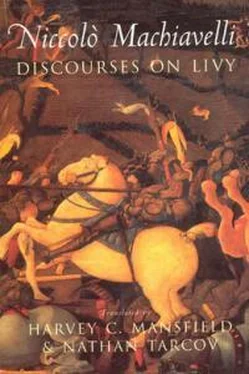Николо Макиавелли - Discourses on Livy
Здесь есть возможность читать онлайн «Николо Макиавелли - Discourses on Livy» весь текст электронной книги совершенно бесплатно (целиком полную версию без сокращений). В некоторых случаях можно слушать аудио, скачать через торрент в формате fb2 и присутствует краткое содержание. Год выпуска: 2014, Издательство: epubBooks Classics, Жанр: История, Философия, на английском языке. Описание произведения, (предисловие) а так же отзывы посетителей доступны на портале библиотеки ЛибКат.
- Название:Discourses on Livy
- Автор:
- Издательство:epubBooks Classics
- Жанр:
- Год:2014
- ISBN:нет данных
- Рейтинг книги:5 / 5. Голосов: 1
-
Избранное:Добавить в избранное
- Отзывы:
-
Ваша оценка:
- 100
- 1
- 2
- 3
- 4
- 5
Discourses on Livy: краткое содержание, описание и аннотация
Предлагаем к чтению аннотацию, описание, краткое содержание или предисловие (зависит от того, что написал сам автор книги «Discourses on Livy»). Если вы не нашли необходимую информацию о книге — напишите в комментариях, мы постараемся отыскать её.
Discourses on Livy — читать онлайн бесплатно полную книгу (весь текст) целиком
Ниже представлен текст книги, разбитый по страницам. Система сохранения места последней прочитанной страницы, позволяет с удобством читать онлайн бесплатно книгу «Discourses on Livy», без необходимости каждый раз заново искать на чём Вы остановились. Поставьте закладку, и сможете в любой момент перейти на страницу, на которой закончили чтение.
Интервал:
Закладка:
And in truth the prince who seeks for worldly glory should desire to be the ruler of a corrupt city; not that, like Cæsar, he may destroy it, but that, like Romulus, he may restore it; since man cannot hope for, nor Heaven offer any better opportunity of fame. Were it indeed necessary in giving a constitution to a State to forfeit its sovereignty, the prince who, to retain his station, should withhold a constitution, might plead excuse; but for him who in giving a constitution can still retain his sovereignty, no excuse is to be made.
Let those therefore to whom Heaven has afforded this opportunity, remember that two courses lie open to them; one which will render them secure while they live and glorious when they die; another which exposes them to continual difficulties in life, and condemns them to eternal infamy after death.
Chapter XI
Of the Religion of the Romans.
Though Rome had Romulus for her first founder, and as a daughter owed him her being and nurture, nevertheless, when the institutions of Romulus were seen by Heaven to be insufficient for so great a State, the Roman senate were moved to choose Numa Pompilius as his successor, that he might look to all matters which Romulus had neglected. He finding the people fierce and turbulent, and desiring with the help of the peaceful arts to bring them to order and obedience, called in the aid of religion as essential to the maintenance of civil society, and gave it such a form, that for many ages God was nowhere so much feared as in that republic. The effect of this was to render easy any enterprise in which the senate or great men of Rome thought fit to engage. And whosoever pays heed to an infinity of actions performed, sometimes by the Roman people collectively, often by single citizens, will see, that esteeming the power of God beyond that of man, they dreaded far more to violate their oath than to transgress the laws; as is clearly shown by the examples of Scipio and of Manlius Torquatus. For after the defeat of the Romans by Hannibal at Cannæ, many citizens meeting together, resolved, in their terror and dismay, to abandon Italy and seek refuge in Sicily. But Scipio, getting word of this, went among them, and menacing them with his naked sword, made them swear never to abandon their country. Again, when Lucius Manlius was accused by the tribune Marcus Pomponius, before the day fixed for trial, Titus Manlius, afterwards named Torquatus, son to Lucius, went to seek this Marcus, and threatening him with death if he did not withdraw the charge against his father, compelled him to swear compliance; and he, through fear, having sworn, kept his oath. In the first of these two instances, therefore, citizens whom love of their country and its laws could not have retained in Italy, were kept there by the oath forced upon them; and in the second, the tribune Marcus, to keep his oath, laid aside the hatred he bore the father, and overlooked the injury done him by the son, and his own dishonour. And this from no other cause than the religion which Numa had impressed upon this city.
And it will be plain to any one who carefully studies Roman History, how much religion helped in disciplining the army, in uniting the people, in keeping good men good, and putting bad men to shame; so that had it to be decided to which prince, Romulus or Numa, Rome owed the greater debt, I think the balance must turn in favour of Numa; for when religion is once established you may readily bring in arms; but where you have arms without religion it is not easy afterwards to bring in religion. We see, too, that while Romulus in order to create a senate, and to establish his other ordinances civil and military, needed no support from Divine authority, this was very necessary to Numa, who feigned to have intercourse with a Nymph by whose advice he was guided in counselling the people. And this, because desiring to introduce in Rome new and untried institutions, he feared that his own authority might not effect his end. Nor, indeed, has any attempt ever been made to introduce unusual laws among a people, without resorting to Divine authority, since without such sanction they never would have been accepted. For the wise recognize many things to be good which do not bear such reasons on the face of them as command their acceptance by others; wherefore, wise men who would obviate these difficulties, have recourse to Divine aid. Thus did Lycurgus, thus Solon, and thus have done many besides who have had the same end in view.
The Romans, accordingly, admiring the prudence and virtues of Numa, assented to all the measures which he recommended. This, however, is to be said, that the circumstance of these times being deeply tinctured with religious feeling, and of the men with whom he had to deal being rude and ignorant, gave Numa better facility to carry out his plans, as enabling him to mould his subjects readily to any new impression. And, doubtless, he who should seek at the present day to form a new commonwealth, would find the task easier among a race of simple mountaineers, than among the dwellers in cities where society is corrupt; as the sculptor can more easily carve a fair statue from a rough block, than from the block which has been badly shaped out by another. But taking all this into account, I maintain that the religion introduced by Numa was one of the chief causes of the prosperity of Rome, since it gave rise to good ordinances, which in turn brought with them good fortune, and with good fortune, happy issues to whatsoever was undertaken.
And as the observance of the ordinances of religion is the cause of the greatness of a State, so their neglect is the occasion of its decline; since a kingdom without the fear of God must either fall to pieces, or must be maintained by the fear of some prince who supplies that influence not supplied by religion. But since the lives of princes are short, the life of this prince, also, and with it his influence, must soon come to an end; whence it happens that a kingdom which rests wholly on the qualities of its prince, lasts for a brief time only; because these qualities, terminating with his life, are rarely renewed in his successor. For as Dante wisely says:—
"Seldom through the boughs doth human worth renew itself; for such the will of Him who gives it, that to Him we may ascribe it." [1] L'umana probitate: e questo vuoleQuei che la dà, perchè da lui si chiami. Purg . vii. 121–123.
It follows, therefore, that the safety of a commonwealth or kingdom lies, not in its having a ruler who governs it prudently while he lives, but in having one who so orders things, that when he dies, the State may still maintain itself. And though it be easier to impose new institutions or a new faith on rude and simple men, it is not therefore impossible to persuade their adoption by men who are civilized, and who do not think themselves rude. The people of Florence do not esteem themselves rude or ignorant, and yet were persuaded by the Friar Girolamo Savonarola that he spoke with God. Whether in this he said truth or no, I take not on me to pronounce, since of so great a man we must speak with reverence; but this I do say, that very many believed him without having witnessed anything extraordinary to warrant their belief; his life, his doctrines, the matter whereof he treated, being sufficient to enlist their faith.
Let no man, therefore, lose heart from thinking that he cannot do what others have done before him; for, as I said in my Preface, men are born, and live, and die, always in accordance with the same rules.
Chapter XII
That It is of Much Moment to Make Account of Religion; and That Italy, Through the Roman Church, Being Wanting Therein, Has Been Ruined
Princes and commonwealths that would save themselves from growing corrupted, should before all things keep uncorrupted the rites and ceremonies of religion, and always hold them in reverence; since we can have no surer sign of the decay of a province than to see Divine worship held therein in contempt. This is easily understood when it is seen on what foundation that religion rests in which a man is born. For every religion has its root in certain fundamental ordinances peculiar to itself.
Читать дальшеИнтервал:
Закладка:
Похожие книги на «Discourses on Livy»
Представляем Вашему вниманию похожие книги на «Discourses on Livy» списком для выбора. Мы отобрали схожую по названию и смыслу литературу в надежде предоставить читателям больше вариантов отыскать новые, интересные, ещё непрочитанные произведения.
Обсуждение, отзывы о книге «Discourses on Livy» и просто собственные мнения читателей. Оставьте ваши комментарии, напишите, что Вы думаете о произведении, его смысле или главных героях. Укажите что конкретно понравилось, а что нет, и почему Вы так считаете.











